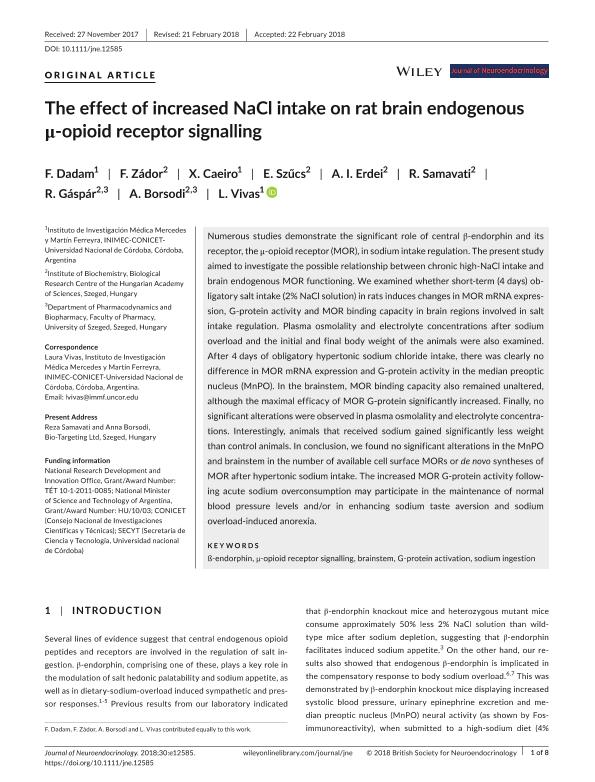Artículo
The effect of increased NaCl intake on rat brain endogenous μ-opioid receptor signalling
Dadam, Florencia Maria ; Zádor, F.; Caeiro, Ximena Elizabeth
; Zádor, F.; Caeiro, Ximena Elizabeth ; Szűcs, E.; Erdei, A.I.; Samavati, R.; Gáspár, R.; Borsodi, A.; Vivas, Laura Marta
; Szűcs, E.; Erdei, A.I.; Samavati, R.; Gáspár, R.; Borsodi, A.; Vivas, Laura Marta
 ; Zádor, F.; Caeiro, Ximena Elizabeth
; Zádor, F.; Caeiro, Ximena Elizabeth ; Szűcs, E.; Erdei, A.I.; Samavati, R.; Gáspár, R.; Borsodi, A.; Vivas, Laura Marta
; Szűcs, E.; Erdei, A.I.; Samavati, R.; Gáspár, R.; Borsodi, A.; Vivas, Laura Marta
Fecha de publicación:
04/2018
Editorial:
Wiley Blackwell Publishing, Inc
Revista:
Journal of Neuroendocrinology
ISSN:
0953-8194
Idioma:
Inglés
Tipo de recurso:
Artículo publicado
Clasificación temática:
Resumen
Numerous studies demonstrate the significant role of central β-endorphin and its receptor, the μ-opioid receptor (MOR), in sodium intake regulation. The present study aimed to investigate the possible relationship between chronic high-NaCl intake and brain endogenous MOR functioning. We examined whether short-term (4 days) obligatory salt intake (2% NaCl solution) in rats induces changes in MOR mRNA expression, G-protein activity and MOR binding capacity in brain regions involved in salt intake regulation. Plasma osmolality and electrolyte concentrations after sodium overload and the initial and final body weight of the animals were also examined. After 4 days of obligatory hypertonic sodium chloride intake, there was clearly no difference in MOR mRNA expression and G-protein activity in the median preoptic nucleus (MnPO). In the brainstem, MOR binding capacity also remained unaltered, although the maximal efficacy of MOR G-protein significantly increased. Finally, no significant alterations were observed in plasma osmolality and electrolyte concentrations. Interestingly, animals that received sodium gained significantly less weight than control animals. In conclusion, we found no significant alterations in the MnPO and brainstem in the number of available cell surface MORs or de novo syntheses of MOR after hypertonic sodium intake. The increased MOR G-protein activity following acute sodium overconsumption may participate in the maintenance of normal blood pressure levels and/or in enhancing sodium taste aversion and sodium overload-induced anorexia.
Archivos asociados
Licencia
Identificadores
Colecciones
Articulos(INIMEC - CONICET)
Articulos de INSTITUTO DE INV. MEDICAS MERCEDES Y MARTIN FERREYRA
Articulos de INSTITUTO DE INV. MEDICAS MERCEDES Y MARTIN FERREYRA
Citación
Dadam, Florencia Maria; Zádor, F.; Caeiro, Ximena Elizabeth; Szűcs, E.; Erdei, A.I.; et al.; The effect of increased NaCl intake on rat brain endogenous μ-opioid receptor signalling; Wiley Blackwell Publishing, Inc; Journal of Neuroendocrinology; 30; 4; 4-2018; 1-8
Compartir
Altmétricas



